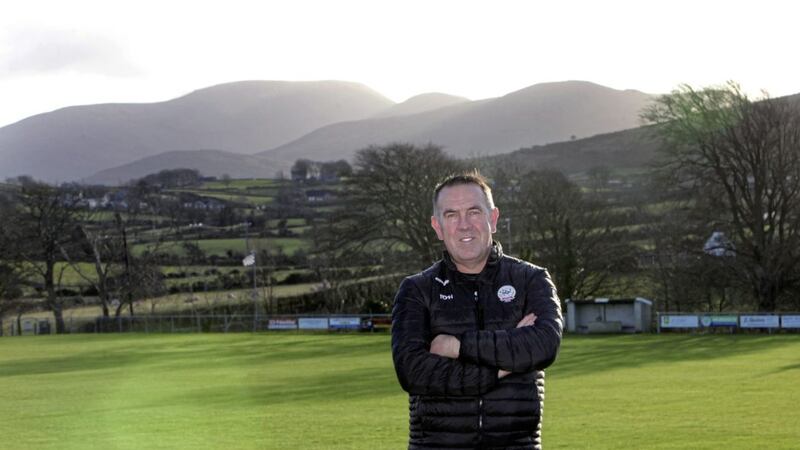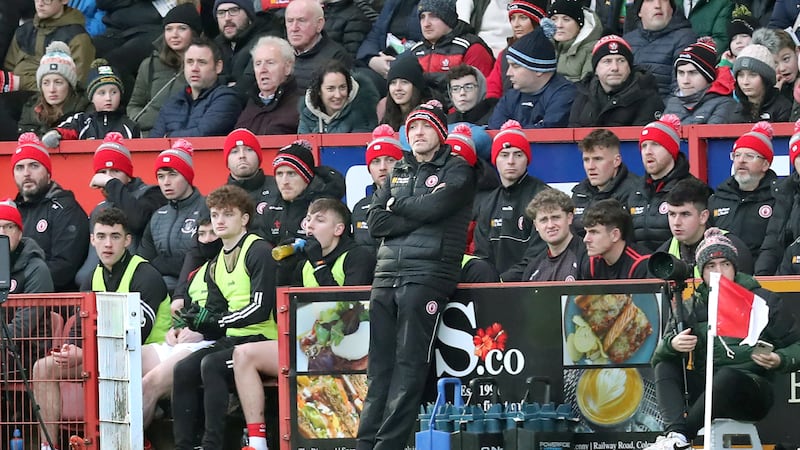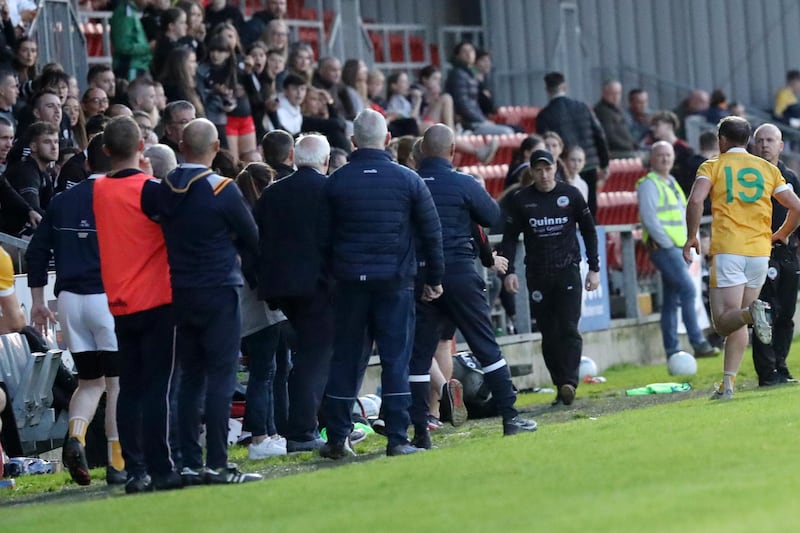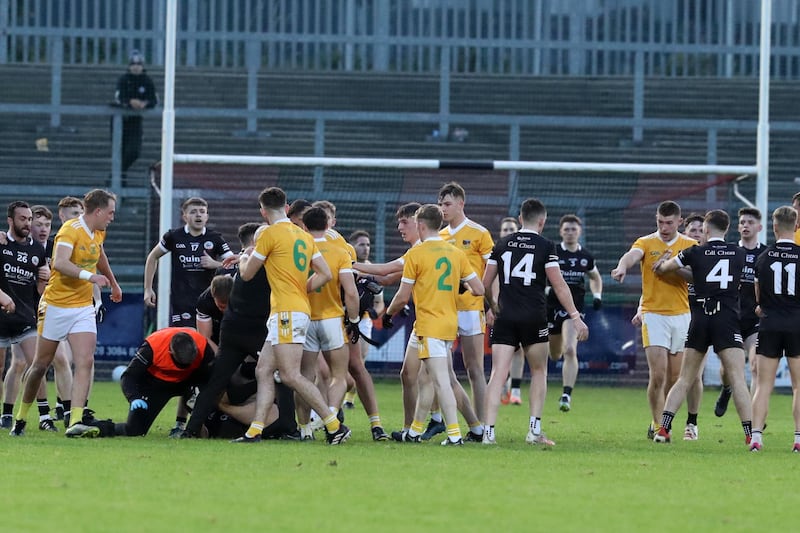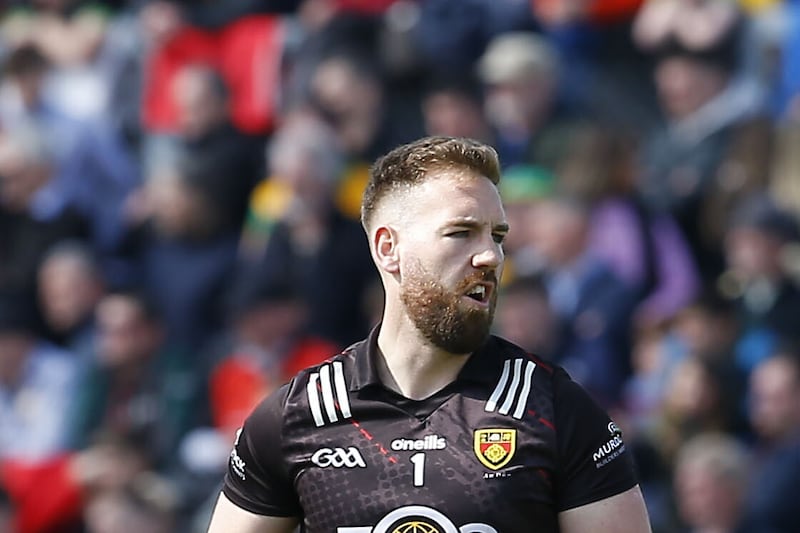IF YOU want something done ask a busy man and if it’s a busy man you’re after, well there aren’t many busier than Terry O’Hanlon.
The Kilcoo chairman is just off a plane from London when we meet and his phone hardly stops as we chat.
“Och, well Sean…”
“Hello Conleith…”
Everything goes through Terry and that’s no surprise because the club, the entire community, is at fever pitch for tomorrow’s All-Ireland Senior Club Football final against Galway’s Corofin.
These are golden days for ‘the Magpies’ and, for the past nine years, Terry has been the driving force of his club. He first wore the black and white jersey at the age of six, following in the footsteps of his father and his grandfather, Steven Hughes, who won “a litany of championship medals” in the 1920s and ‘30s.
Kilcoo captured nine county titles between 1917 and 1937 but then emigration decimated the rural community nestled up in the Mourne Mountains between Castlewellan and Hilltown. One weekend, three-quarters of the senior team left in search of work across the Atlantic Ocean. Gravestones now bear some of their names in cemeteries in Detroit and New York.
The 1940s and ’50s were lean years as the club tried to rebuild but in the 1960s Hugh John Fitzpatrick started a minor team and things began to look up. Fitzpatrick’s efforts bore fruit and the rebirth of the club we know today came in the early 1980s when Kilcoo moved from its rented base at Stephen’s Green, on the Bryansford-Hilltown Road, to their present grounds near the village.
“A lot of club’s were trying to get their own grounds at that time,” explains Terry, who’s been based in London from Tuesday to Thursday for the last seven years running a brickworks company.
“We didn’t own a pitch and we had an opportunity to buy land. The club chairman Danny Murray, my wife’s uncle, and the present club president, Paddy Morgan, had the vision to take us to Eoghan Rua Park.
“Proper men were put in place to manage teams and to start a proper underage structured coaching program and the fruit of that came in 1998 when we won our first minor championship, led by Anthony Devlin, and then 2006 when we won the All-lreland U14 A Feile.”
When Terry started in the senior team Kilcoo were playing in the lower leagues in Down but they worked their way up the ladder. He was captain of the teams that finished runners-up in division three and then two to earn a place among the county’s elite.
“When we were playing at the bottom of Division Three, my lifelong ambition was just to play in Division One but I never dreamt of what was ahead of us,” he says.
“I remember the first game in Division One, we were managed by Barney McAvoy, John Morgan and Sean Gribben, men who owe our club nothing, and they got Gregory McCartan (Down All-Ireland winner) in to coach us. The first game was against Burren, in Burren.
“When we were going onto the field, it came out over the loudspeaker: ‘We welcome Kilcoo to St Mary’s Burren, welcome to Division One and long may you last.’ I’ll never forget it.”
The Magpies were expected to survive for a season or two and then gradually sink back to where they’d come from but, driven by the fierce pride that has become their hallmark, it soon became apparent they had no plans to go anywhere but up.
“We were given little chance but we finished in the top four in the first few years and then Jim McCorry (former Armagh manager and player) came into the club in 2001 and we won our first senior league in 2003,” Terry explains.
In 2004, aged 35, Terry’s days at centre half-back came to an end and he switched his attention to management, again with success. He was part of a management team that won the first of a three in-a-row of minor championships in 2009, the same year the seniors bridged a 72-year gap that stretched back to the men of the 1930s by winning the senior championship.
In 2012 he became chairman and has been the figurehead of the club ever since.
“I don’t think it was ever an ambition of mine to be chairman,” he says.
“I ended up doing it and it is the greatest period in the club’s history but I wouldn’t put it down to me,” he adds modestly.
“Everybody has to think the same way: that everything is for the greater good of the club and you have to surround yourself with the right people.
“We have Roger Morgan, Seamus McClean, Mickey Kane, Niall Morgan and a strong executive committee of 30 and another army of workers behind them. They’re unreal and this year Seamus O’Hanlon has taken over from Ionagh McEvoy, who had given great service for four years as club secretary. Maybe my people skills had something to do with that? I don’t know.
“But I couldn’t imagine Kilcoo parish without a club and I think we prove that even if you’re a rural club, you can still be up with the best.
“The will to win and the passion we have is serious. A big thing about Kilcoo is that all differences are left outside the gate, they are all set aside and there are no fall-outs within the club and it’s not about individuals.
“You have to have to create an environment that everybody is treated equally and in my nine years as chair I have never asked someone to do something that they didn’t do, never, and that shows you the type of club it is.
“The men that do the gate or cut the grass, or the ladies that do the work, or the executive committee, or the players… I’m no more important than any of them.”
Following on from the Trojan work of his predecessor Roger Morgan, Terry rolled up his sleeves and plotted a course that has taken the club right to the top of Down, Ulster and now Ireland. The journey was fuelled by a high-octane mix of hard work, talent, imagination, parish pride and a fierce determination to match the exploits of their more fashionable neighbours and prove Kilcoo is as good as any club in county Down.
“When I was playing you had Castlewellan, Bryansford, Mayobridge and Burren and they always won the county titles,” says Terry.
“I think it was my job as the club chairman to prove that we were as good as anybody else and we had our right at the top table in Gaelic Football, we had a right to be there and to challenge everybody to get where we are.
“I think we’re driven by where we come from. I think when you start in Division Three and you rise the whole way you never forget where you come from and our heritage is a big part of it.
“There was great leadership within the club and an ability to see into the future, you always have to think ahead because by standing still you go backwards so it was always important to put back into our youth.
“It’s also very important that you stay humble no matter what we have won and the success that we’ve had, you have to stay grounded – we aren’t running about shouting from the hilltops that we’re going to win the All-Ireland.”
During his time as chairman, Kilcoo have won seven Down Championships, the historic first Ulster crown and a shed-full of league and underage silverware. It hasn’t all been plain sailing though. The image of the club hasn’t always been as positive as it could have been.
“Our club’s not in the habit of criticising anybody else but if anyone wants to criticise us, they should have a look at their own club first,” says Terry.
“If you get in among the Kilcoo people, they are the best people in the world, the most hospitable and they would do anything for you. But if you fall out with one of us you fall out with us all. We can insulate ourselves away from everything and be driven by the fact that other people don’t like us or haven’t liked us over the years.
“If you’ve been at the top as long as we have in Down football I don’t think it’s anything to do with your image, I think people don’t like you because you’re winning.”
This All-Ireland run has allowed Kilcoo to put its best foot forward and showcase the undoubted quality and positivity that exists in and around the club. Some say there’s nothing but football, Mass and farming in the area but that is changing and the Eoghan Rua grounds are right at the centre of it all.
There is a new gym, a walkway, a playground and a brand new community centre at the club and grants of £450,000 have been secured to build two new changing rooms next year.
“It has all been achieved by our hard working development committee led by Sheila Kelly and Liam McEvoy,” says Terry, who adds with a smile: “Here, we’re no dozers!”
Among his many crucial decisions the appointment of current manager Mickey Moran stands out as a visionary masterstroke. The Derry football guru with the Midas touch was tempted out of retirement last year after Paul McIvor’s successful four-year reign, which had followed Jim McCorry’s three in-a-row, came to an end.
Moran has worked wonders with a team that had looked to be in decline last year. His calm presence reclaimed the county title and kicked on from beating Donegal’s Naomh Conaill in the Ulster final by beating Dublin’s Ballyboden to reach tomorrow’s national showpiece.
“I identified Mickey,” says Terry.
“But it was up to our committee and players to convince him that we had the attitude, commitment and desire to build on what we had already achieved and take things to another level, firstly in Down and then in Ulster.
“Paul did a really good job and he left amicably and at that point I knew, as chairman of the club, that we needed to refocus, everything from top to bottom needed to refocus.
“We had a serious number of high profile players and we needed the top man. We brought Mickey Moran in to refocus the club and that’s exactly what he did.
“We wanted the best possible man with the experience to win an Ulster title. We felt we had the players but they need managing, they are all great lads but they need man-managed and Mickey is the best man ever I seen at doing that.
“He came in, refocussed the whole club, and look at the success we’ve had. Our style of football is better, it’s easy on the eye and the team has grown around him.
“We wanted to claim back the county title, which we did, and then see where else we could go. We did bring him in to win an Ulster title and he has proved to be the best appointment ever in our club along with Conleith (Gilligan) and Paul (Devlin). They are a joy to work with, nothing is a problem.”
When he started playing for Kilcoo, Terry changed in the back of an “oul bread-van” at the old Stephen’s Green pitch. Tomorrow the Johnstons, the Devlins and the McEvoys, all sons of the men he played alongside, will be changing in Croke Park.
“That’s how far we’ve come,” he says, with pride and delight.
But there’s an understandable trace of sadness too because his own son, Darragh, who for so long was the heartbeat of the team, will miss out because of injury. Darragh battled back from spinal surgery last year to regain his fitness only to have it snatched away again by a cruciate ligament injury. It’s cruel luck that he’ll miss out on the biggest day in the club’s history.
“Ah Jaysus, it’s desperate,” says Terry.
“He’s very unfortunate to come through what he has… I don’t know what to say. It’s heart-breaking for Tara and me, it’s heart-breaking for the family…”
He’ll do his best to keep a lid on his emotions tomorrow but that won’t be easy. Over 20 years ago, Darragh was counting the days down to a visit from Santa when what it means to be part of the club was brought home to his father.
“I broke my ankle playing for Kilcoo in the league play-offs in 1998,” recalls Terry, a bricklayer by trade.
“We had three wee children in the house and it was three or four days before Christmas. I remember Seamus McClean, the treasurer then and still today, came in and gave us 500 quid.
“For the club to do that… It meant so much to me but that’s the way we are. The pride is handed down through the generations, from our forefathers – the love of the jersey, the love of the club. That’s what’s most important. It’s the heart and soul.”
Kilcoo will play with heart and soul, pride, passion and skill tomorrow but the players (every one of them went to Kilcoo Primary School and was taught by Glasgow-born Mrs Mussen) take the field as underdogs against three in-a-row-chasing Connacht champions Corofin.
“If somebody had said to me at the start of the season: ‘You’re going to be in an All-Ireland final in January’ I would have questioned them,” says Terry.
“I now know we’re there on merit. Have we got a chance? I’m not going to say we’re going to win it, but we’ll have a big say in who does.
“If Conor Laverty and Aidan Branagan go up the steps to lift the Andy Merrigan Cup it will be my greatest ever day in sport but I won’t get caught up in the emotion of that until it happens and we have to make it happen.”
Yes, they have to make it happen and we have to wrap it up there because, as I said, Terry’s a busy man and he’s heading home to change for the Gaelic Life awards dinner where Kilcoo was named Club of the Year.
“I’m very passionate about it,” he says, as we go our separate ways. “I’d say you can see that?”
See it? Man dear, I can feel it! Passion radiates from him. It’s infectious.
It has given him the power to inspire his community to turn bog and rock into manicured football pitches and a community hub, to give Kilcoo’s young people the gift of pride in their club, bring young and old together under one black and white banner and convince Mickey Moran to come out of retirement and lead them all the way to Croke Park.
They'll give everything tomorrow.
